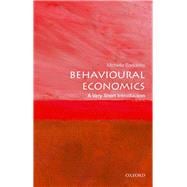Traditionally, economists have based their economic predictions on the assumption that humans are super-rational creatures, using the information we are given efficiently and generally making selfish decisions. Economists also assume that we're doing the very best we can possibly do--not only for today, but over our whole lifetimes too.
The study of behavioral economics is revealing that our lives are not that simple. Instead, our decisions are complicated by our own psychology. Each of us makes mistakes every day. We don't always know what's best for us and, even if we do, we might not have the self-control to deliver on our best intentions. We struggle to stay on diets, to get enough exercise and to manage our money. We misjudge risky situations. We are prone to herding: sometimes peer pressure leads us blindly to copy others around us; other times copying others helps us to learn quickly about new, unfamiliar situations.
This Very Short Introduction explores the reasons why we make irrational decisions; how we decide quickly; why we make mistakes in risky situations; our tendency to procrastination; and how we are affected by social influences, personality, mood and emotions. The implications of understanding the rationale for our own financial behavior are huge. Behavioral economics could help policy-makers to understand the people behind their policies, enabling them to design more effective policies, while at the same time we could find ourselves assaulted by increasingly savvy marketing. Michelle Baddeley concludes by looking forward, to see what the future of behavioral economics holds for us.
ABOUT THE SERIES: The Very Short Introductions series from Oxford University Press contains hundreds of titles in almost every subject area. These pocket-sized books are the perfect way to get ahead in a new subject quickly. Our expert authors combine facts, analysis, perspective, new ideas, and enthusiasm to make interesting and challenging topics highly readable.








